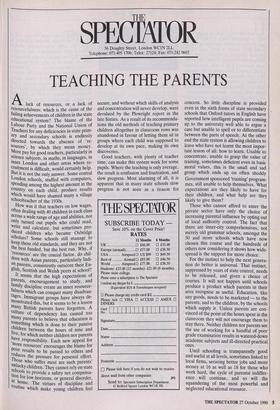TEACHING THE PARENTS
Alack of resources, or a lack of resourcefulness: which is the cause of the failing achievements of children in the state educational system? The blame of the Labour Party and the National Union. of Teachers for any deficiencies in state prim- ary and secondary schools is endlessly directed towards the absence of 're- sources', by which they mean money. More pay for good teachers, particularly in Science subjects, in maths, in languages, in inner London and other areas where re- cruitment is difficult, would certainly help. But it is not the only answer. Some central London schools, stuffed with computers, spending among the highest amount in the country on each child, produce results which would have shamed many a village schoolteacher of the 1930s.
How was it that teachers on low wages, often dealing with 40 children in each class across a wide range of age and abilities, not only turned out pupils who could read, write and calculate, but sometimes pro- duced children who became Oxbridge scholars? Some schools still manage to keep these old standards, and they are not the best funded, but the best run. Why, if resources' are the crucial factor, do chil- dren with Asian parents, particularly Indi- an parents, consistently outscore their En- glish, Scottish and Welsh peers at school? It seems that the high expectations of parents, encouragement to study, and family discipline create an inner resource- fulness which can conquer many disadvan- tages. Immigrant groups have always de- monstrated this, but it seems to be a lesson many British parents have forgotten. A culture of dependency has caused too many parents to believe that education is something which is done to their passive children between the hours of nine and five, for which neither children nor parents have responsibility. Each new appeal for more resources' encourages the blame for poor results to be passed to others and reduces the pressure for personal effort. Those who suffer most are such parents' unlucky children. They cannot rely on state schools to provide a safety net compensa- tion for low horizons, or general disorder, at home. The virtues of discipline and routine which make young children feel secure, and without which skills of analysis and concentration will never develop, were devalued by the Plowright report in the late Sixties. As a result of its recommenda- tions the old methods of teaching primary children altogether in classroom rows was abandoned in favour of letting them sit in groups where each child was supposed to develop at its own pace, making its own discoveries.
Good teachers, with plenty of teacher time, can make this system work for some pupils. Where the teaching is only average, the result is confusion and frustration, and slow progress. Most alarming of all, it is apparent that in many state schools slow progress is not seen as a reason for concern. So little discipline is provided even in the sixth forms of state secondary schools that Oxford tutors in English have reported how intelligent pupils are coming up to the university well able to argue a case but unable to spell or to differentiate between the parts of speech. At the other end the state system is allowing children to leave who have not learnt the most impor- tant lesson of all: how to learn. Unable to concentrate, unable to grasp the value of training, sometimes deficient even in basic moral values, this is the small and sad group which ends up on often shoddy Government sponsored 'training' program- mes, still unable to help themselves. What expectations are they likely to have for their children, and what help are they likely to give them?
Those who cannot afford to enter the private sector have only the choice of increasing parental influence by opting out of local authority control. The fact that there are inner-city comprehensives, not merely old grammar schools, amongst the 50 and more schools which have now chosen this course and the hundreds of others now considering it shows how wide- spread is the support for more choice.
For the instinct to help the next genera- tion do better is universal. That instinct, suppressed by years of state control, needs to be released, and given a choice of courses. It will not happen until schools produce a product which parents in their area recognise as useful. Education, like any goods, needs to be marketed — to the parents, and to the children, by the schools which supply it. Unless parents are con- vinced of the point of the hours spent in the classroom they will not encourage them to stay there. Neither children nor parents see the use of working for a handful of poor grade examination results in watered-down academic subjects and ill-directed practical ones.
Until schooling is transparently good and useful at all levels, sometimes linked to local firms, securing better jobs and more money at 16 as well as 18 for those who work hard, the cycle of parental indiffer- ence will continue, and so will the squandering of the most powerful and neglected educational resource.


































































 Previous page
Previous page